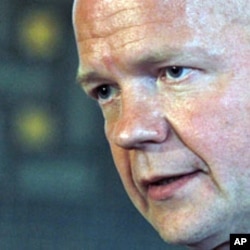In a speech late Wednesday, Britain's Foreign Secretary William Hague spoke of the historical significance of the recent uprisings.
"The eruption of democracy movements in countries of the Middle East and North Africa is, even in its early stages, the most important development of the early 21st century in my view, with potential long-term consequences greater than either 9/11 or the global financial crisis in 2008,” Hague said.
And he said the future looks bright for the other parts of the world as well.
"The forces that led to the Arab Spring will sweep more widely across the globe," Hague said. "Demands for open government, action against corruption and greater political participation will spread by themselves over time, not because Western nations are advocating them but because they are the natural aspirations of all people everywhere."
Hague said governments that are resisting change, like those of Libya and Syria, are “doomed to failure”.
But he said the so-called Arab Spring needs international support in order to stop countries backtracking towards even more authoritarian regimes.
Europe, he said, should build more economic ties with those countries working towards democracy.
Politics expert Richard Whitman, of Britain’s Bath University, says countries across Europe want to move towards greater economic integration.
"The question of supporting economically and particularly liberalizing trade, providing foreign aid and so on, is uncontroversial to be done collectively by European governments," said Whitman.
But he says Hague’s speech also reflected a general division in Europe.
Whitman says Britain and France have reacted to the crisis in Libya unilaterally, rather than as part of a wider European Union. They have pushed for greater intervention, he says, where other countries have held back.
"What is highly controversial, and which there is a much smaller group of countries willing to consider, is the provision of military support or military-related support in terms of training, equipping and so on," said Whitman. "That is really where you find quite a difference of opinion between different governments."
Whitman says it has been a blow to the E.U. effort to work as a cohesive unit on foreign policy.
Hague said he never has believed the European Union can or even should act as if it were a nation state with a national foreign policy.





